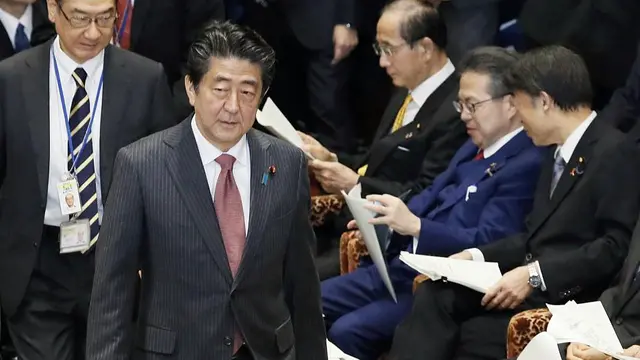Japanese Prime Minister Shinzo Abe announced on Monday his plan to disband the lower house for a snap election when the extraordinary Diet convenes on Thursday, in a move that observers described as Abe's greatest risk yet which might endanger his future premiership.
So what are Abe’s intentions in calling for a snap election expected to take place next year? And what challenges might the 63-year-old face down the road?
Why a snap election?
Analysts say that by calling for early elections, Abe is taking advantage of revived support among the public and capitalizing on the current weakness of the opposition.
Abe’s approval ratings had been eroded by two cronyism scandals involving university operator Kake Educational Institution, run by a close friend of Abe, and private school operator Moritomo Gakuen.
His ratings had dropped to less than 30 percent in July but recovered to above 50 percent this month.
Yasunori Kagoike (C), head of a nationalist Osaka school operator at the center of a growing political scandal connected to the prime minister and defense minister, attends an upper house panel in Tokyo on March 23, 2017.
It is almost inevitable that Abe will face grilling from opposition parties over these allegations when the Diet convenes on Thursday.
"The government could come under scrutiny from the public again and its approval ratings may start falling," a source from the ruling Liberal Democratic Party (LDP) told Kyodo News.
Another senior ruling party lawmaker told Kyodo News that Abe knew it is “wise to dissolve (the lower house) before the problems become bigger," as the probe findings of Moritomo Gakuen's land acquisitions are expected to be reported and the education ministry may decide in late October on whether to approve the new vet school sought by Kake Educational Institution.
Abe denies all allegations presented against him and on Monday said dissolving the lower house was not an attempt to avoid them.
Abe is also taking advantage of the fact that opposition parties are not well prepared for a general election.
The Democratic Party (DP) has just elected a new leader, Seiji Maehara, earlier this month and is yet to muster enough strength to defeat the ruling coalition, as Maehara
rejects forming a united front with Japan’s Communist Party.
Japanese Prime Minister Shinzo Abe speaks in a special session of the House of Representatives Budget Committee in Tokyo, Japan, on July 24, 2017.
Another reason might be that a snap election can win Abe’s government some time to prepare for US President Donald Trump’s visit to Japan in November.
What challenges Abe faces ahead?
Aiji Tanaka, a political science professor at Waseda University, told Japan Times that the ruling coalition’s bid to maintain a two-thirds majority is within the realm of possibility.
“But what Abe desires is that his LDP alone could gain a two-thirds majority, to pave the way for the Pacifist Constitution revisions,” said Jiang Yuechun, senior research fellow and director of the Department for World Economy and Development Studies at the China Institute of International Studies, in an interview with CGTN.
The LDP reportedly wants to call a national referendum on its first amendment during next year’s Diet session. Before the constitution could be amended, the revision must be proposed by two-thirds of the members of each house of Japan's parliament and must be approved by a majority of voters in a referendum.
However, Abe’s race to his goal is still fraught with uncertainties. In the latest challenge, former LDP cabinet member and current Tokyo Governor Yuriko Koike launched on Monday a new national political party called "Kibo no To" (Party of Hope), in an attempt to form a united front against Abe.
Tokyo Governor Yuriko Koike holds a placard reading her new party name "Party of Hope" during a news conference at Tokyo Metropolitan Government Building in Tokyo, Japan, on September 25, 2017.
“Another challenge is that there are factions within the LDP,” Jiang pointed out. Over the weekend Koike’s new party saw a number of defectors deserting their parties to join her new group, including Mineyuki Fukuda, an LDP lawmaker.
“This move might cause a domino effect within the party and more could leave the LDP, which can facilitate the regrouping of opposition parties,” Jiang commented.
And even if Abe’s party wins the election, there are still rivals within the LDP.
Potential challengers include Shigeru Ishiba, who lost to Abe in the 2012 race to lead the LDP and later served in his cabinet, the leader of the newly-launched Party of Hope Koike, along with Fumio Kishida, who left the cabinet for a role as party policy chief last month. Another probable rival is Internal Affairs Minister Seiko Noda, who has openly said she plans to challenge Abe for the party presidency next year.
(CGTN)
 简体中文
简体中文





